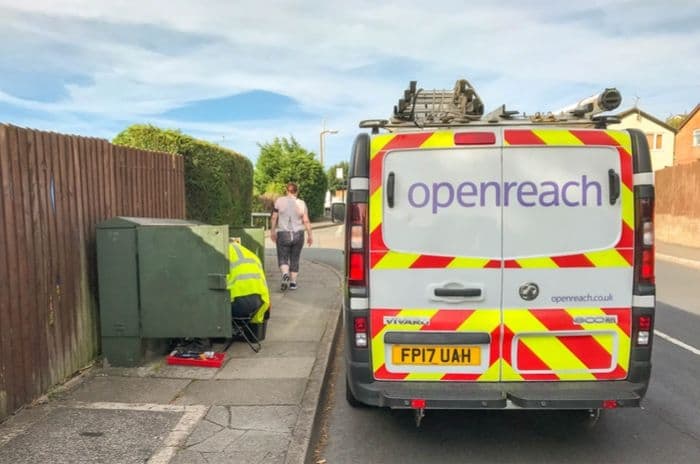Home > Broadband > News > Opening ducts may not open up the broadband market
Opening ducts may not open up the broadband market
OFCOM have outlined plans to make BT Openreach's infrastructure more accessible to rival broadband networks, in a move that's hoped will stimulate more competition in the broadband market and better value for customers.

These plans include proposals to force BT to provide rival suppliers with "fair access" to ducts and poles, to force them to repair infrastructure and tunnels where requested, and to draw up exhaustive maps of their network so that other providers can plan accordingly.
Ofcom state that such measures will "make it quicker and easier for BT's competitors to build their own fibre networks all the way to people's doorsteps using Openreach's existing telegraph poles and 'ducts'".
Yet while they will make the cost of constructing rival networks cheaper, there's still the question of how much cheaper and easier it will become, and of whether this will make enough of a difference to incentivise any of BT's competitors to become a genuine threat to their near-monopoly.
Physical Infrastructure Access
Our guide to leaving your ISP
What causes internet connection problems?
How to boost your speeds
Much of this doubt comes from the fact that BT were already offering access to their ducts and poles to anyone who was willing to pay for it.
In fact, in 2011, after pressure from rival networks, they lowered their prices for their so-called Physical Infrastructure Access (PIA) scheme. They also provided a 30% discount on these same prices for bids related to Broadband Delivery UK (BDUK).
Then, in 2013, they lowered their prices again, making the standard rate equal to their discounted BDUK rate, with it costing 60p per metre for spine duct access, for example.
Despite this, Ofcom have been told by numerous providers that the current PIA scheme is "not fit for scale deployment of fibre networks", meaning that making extensive use of it isn't really feasible for rival networks.
This is part of the reason why the regulator published their Digital Strategic Review in February 2016, in which they announced that Openreach's infrastructure must be made more accessible to BT's rivals.
Measures
And now, as a result of the review, they've published a plan to do just that, with their "Consultation on Duct and Pole Access remedies" proposing the following measures:
- Price cap: a ceiling on the prices BT can charge for Physical Infrastructure Access.
- Spreading costs: rather than recovering costs simply by the fee they directly charge individual operators, Openreach should spread recovery across all their services.
- Network 'ready for use': Openreach are required to repair infrastructure and clear tunnels whenever asked to do so by a rival operator wishing to use their infrastructure.
- Final connections into homes: BT must ensure that there's sufficient space on their telegraph poles for rival providers to connect homes to their own networks.
- Better information: Openreach must develop their "digital map" of ducts and poles so that rivals are better to plan future extensions to their own networks
According to Ofcom's Competition Policy Director, Yih-Choung Teh, such measures "will put other providers on a level playing field with BT, so they have the confidence to invest in their own full-fibre networks".
They were also evaluated positively by a number of BT's rivals, with a TalkTalk spokesperson saying, "This is positive news for consumers. If Ofcom get this right, it should mean greater choice, lower prices and better services".
The big 'if'
Who's better: Virgin or Hyperoptic?
Getting ultrafast fibre where you live
Comparing the best broadband deals
However, as of yet there are no plans from any of the major ISPs using the Openreach network to actually start laying down a rival network of their own, suggesting that the dominant status quo may remain in place for a while yet.
That said, it may provide a significant shot in the arm for alt nets such as CityFibre and Hyperoptic, who have been gradually expanding their respective networks over recent years and who arguably offer a superior broadband service.
Ofcom's plans may enable them to extend their networks into areas where BT and the other Openreach-powered providers have a stranglehold. If enough members of the public are willing to take a chance with them, then this in turn would put pressure on the likes of BT to begin offering gigabit FTTP broadband of their own.
This is a big "if", however, since the level of the cap likely to be imposed by Ofcom isn't yet known. There therefore isn't much certainty as to whether it would offer a massive improvement over the current regime.
But more fundamentally, even with a reduction in costs, the use of Openreach's infrastructure still wouldn't save competing networks from the expense of laying new fibre optic cables of their own and from having to build infrastructure where there is none.
As such, any new network they offered would come at a premium relative to the costs of an Openreach-powered connection, something which would arguably cause the "average" customer to remain with familiar, cheaper providers such as BT, Sky, Plusnet or TalkTalk.
And this is the biggest obstacle to investment, since most alt nets would be willing to take a leap even with more expensive investments so long as they knew they'd be rewarded with enough customers.
Ultimately, this is why, even though Ofcom's plans represent a significant step on the long road towards a more competitive broadband market, the general public will probably have to wait a little while longer for reliable ultrafast and gigabit speeds.

We are independent of all of the products and services we compare.

We order our comparison tables by price or feature and never by referral revenue.

We donate at least 5% of our profits to charity, and we aim to be climate positive.
Latest News

29 December 2025
Community Fibre drops mid-contract price rises for new customers
29 December 2025
FACT warns users of illegal streaming after police investigation
23 December 2025
UK fixed broadband performance: latest Opensignal reportGet insider tips and the latest offers in our newsletter


